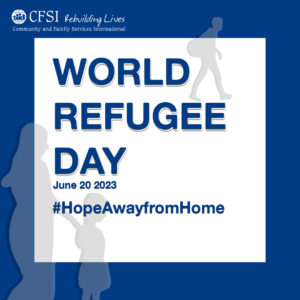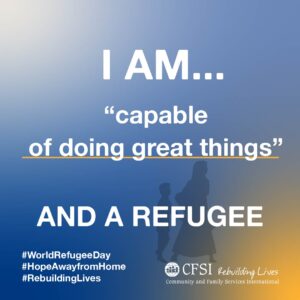June 20 is World Refugee Day.
As the rate of forced displacement due to climate-related disasters, conflict, and persecution continue across the world at a rapid and increasing rate, this World Refugee Day, we at CFSI invite everyone to hear directly from refugees. Listen and learn with us – from refugees’ experiences, their strengths, the challenges they continue to face, and most importantly, how we as a community can work together towards durable solutions for all people forced to flee.
In observance of #WorldRefugeeDay, read about the stories of refugees who have found #HopeAwayFromHome in the Philippines.
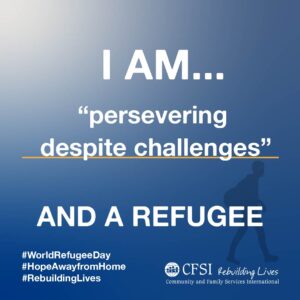
“I am standing here right now because I have made improvements over the years… I do believe that I still have a long way to go, but where I am right now, I can stand on my own and pay my bills by myself.” – Daniel
Daniel, passionate about technical work, was an airplane mechanic in Angola before he had to flee his home to find safety in the Philippines.
His journey was not easy, being forced to leave the country he called home due to persecution and fear for his life. He was already living in the Philippines for a few years before his refugee status was approved in 2019. He recalls, “in the beginning, it was really hard being here in the Philippines. There was a time I did not even have a place to stay, I did not have food to eat, and I was on my own. I had to look for people around me and ask for help, so it was really hard. I became hopeless. I did not think it would change – and I thought I was going to die in the situation I was in before. So I kept faith, I kept praying. Then good things happened, and things changed.”
From Manila, he moved to Pampanga in 2019 after being granted his refugee status. He then moved to Manila in 2022 and was accepted for a job in a call center in Makati. “It took a lot to be able to find a job and work, stand on my own, and support myself. I was not able to do that for a long period of time, for more than a year I never knew what to do. I needed people’s help to be able to find a safe haven… I am standing here right now because I have made improvements over the years. It took a lot to be able to find a job and work, stand on my own, and support myself.”
In spite of how far Daniel’s come since having to flee his home in Angola, he continues to strive for improvement and to look for more opportunities for himself. One example of this is training, which he took with CFSI. “Three months ago, I had training in CFSI. Still, I need to improve myself and have better opportunities.”
Daniel believes that organizations that try to understand refugees’ situations and tailor support to each individual can make a world of difference to refugees like him. “That’s what happened to me exactly. [CFSI] came and asked what they can do to help me, and then what I can do. By understanding what I can do, they proposed solutions for my situation.” He recalls how CFSI supported him in looking for a job, “they suggested I apply for specific companies. They helped me search for work, and I went there and followed their advice.”
Now with a job, a home, and enough stability that he can support himself, Daniel still believes that he has more to achieve. “I do believe that I still have a long way to go, but where I am right now, I can stand on my own and pay my bills by myself… I cannot say to myself that I am 100%, I still have a long way to go and still have to make improvements. I still need to have training to get better opportunities in the future.”
“I want to learn how to drive. I also want to open a restaurant here. It is possible, I know that… but with God, I know anything is possible.” – Yvette
Internal armed conflict in Cameroon that led to the loss of her husband forced Yvette to flee her home country with her son. Fearing that their lives were in danger as a result of the ongoing violence, she sought help from friends who helped her seek refuge in the Philippines.
“When I came here to the Philippines, I did not have any job… CFSI took care of me and my son in the beginning,” Yvette recalls of having to start over with barely anything while still grieving the loss of her husband, relying on friends and family for their survival before finding support from CFSI. “When I came here, I was very depressed because I [had just] lost my husband. CFSI gave us food, financial support, and a bed.”
After being approved for their refugee status, she started to rebuild their lives. “CFSI showed me everything – how to go out in the Philippines, how to ride the jeepney, how to ride a tricycle, and how to go around the country and the city. They also helped me how to speak Tagalog… [they] helped me to attend English and computer classes, because I am a French speaker and did not know how to speak English.” Since then, Yvette has found work at a call center, where she has been working for the last three years, able to provide for her and her son’s needs.
“I am good now. Now I can be here in the Philippines, and I can now understand what people are saying [in Tagalog and English]. I am also making friends.” Finding a home and her hope away from her home in Cameroon, Yvette is also now actively involved in her community.
“I found the church. The church also helped us to have food. So we have friends, CFSI, and the church… I am happy with my church members, pastors, other brothers and sisters, and friends from my job like my colleagues. They are very kind.”
For Yvette, anything is possible with her faith and a little help from friends. Apart from financial assistance to help with daily needs, she understands the importance of education and training for refugees like her to get back on their feet. “I see what [CFSI] did for us. It is good because they helped organize English classes, computer classes, and provided us with food until I later found a job.”
“CFSI was my family, and they are my family until now. I am here today with their help; they helped me communicate with the DOJ [Department of Justice] and learn everything about the Philippines.”
Looking to the future, Yvette is hopeful about finding love again and working towards buying a home for her family. “Apart from that, I can say that I am okay. I have a job, I found CFSI, I know how to work in the Philippines, and I worked for my company for almost 3 years and now I have experience.” Like anyone else, Yvette has goals and dreams she hopes and works to achieve, “I want to do great things. I want to be happier, and I want to learn how to drive. I also want to open a restaurant here. It is possible, I know that… but with God, I know anything is possible.”
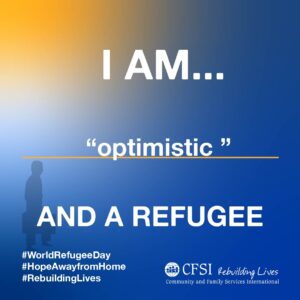
“I have the opportunity to work, to be able to stay here for good, to have a healthy life, and to support myself. The life here is very hopeful and very supporting for me.” – Ahmed
Ahmed was a software engineer in Pakistan until he was forced to flee his home to seek for safety elsewhere.
As with all persons uprooted from their homes and communities, starting over was far from easy for Ahmed. “I found myself in a very hard situation… I had nothing, I had no one, and I did not have any support from people I know. It was the hardest time in my life, and I was homeless at that time.” He recalls how received the support that helped him start rebuilding his life. “[When] I went to the DOJ [Department of Justice in the Philippines], they referred me to CFSI. I received shelter from them, and I was able to finally start my life again.”
Years after being granted refugee status through coordination between CFSI and the Department of Justice in the Philippines, he remembers the challenges that he had to overcome. “[My application for refugee status] was approved by the DOJ. Even when I already had my job, I always followed instructions regarding my work permit, immigration, and all documents required for the DOJ and the companies I was applying to. I keep all my records, and I [used to] always follow up with CFSI because they were the ones I could ask for support.”
Ahmed today continues to work as a software engineer – a job that he knows and is passionate about, this time in his new home in the Philippines. That is not all he is, however – he is also an avid traveler. “I like traveling and discovering new places. I want to have more experiences with different places. My work is in computers and phones, but I do not like spending my time playing games. So when I’m not working, I like to spend it in real life, traveling and going to different places.”
His life in the Philippines, however, also comes with its own share of challenges – just like every other Filipino. As companies transition from remote to on-site work following movement restrictions from COVID-19, he is required to move to Manila, where expenses are too high for what he is earning. Ahmed is now looking for work that will allow him to continue working remotely from his home in the province. Despite this, he has high hopes for himself and his future. “I like the life [I have] here in the Philippines. I want to continue my life here and I want to stay here for good. I have the opportunity to work, to have a healthy life, and to support myself. Life here is very hopeful and very supporting for me.”
Ahmed someday hopes to be to someone what CFSI was to him when he needed the support. “CFSI helped me during the hardest time of my life. They helped me give back to others and have a stable life again. I am really dreaming about that and hoping I can share my experiences and support other people as well.”
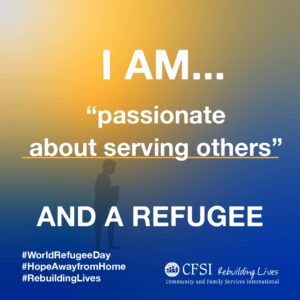
“The last past 4 or 5 years were very hard, but with the help of CFSI I have become happy and satisfied. Now, I am much happier in what I am doing compared to the past.” – Wasim
Before seeking refuge in the Philippines, Wasim was a social worker for seven years at a Non-Governmental Organization (NGO) in Pakistan.
Many years after having to leave his home country, he happily says that he favors his newfound life in the Philippines where he continues to serve others. “Currently, I am working in a small grocery store in Gensan [General Santos City]. I like waiting for customers and serving them here. I am much happier in what I am doing now compared to the past.”
Despite some difficult few years, he believes that he is still developing, and trusts that this will take time. “This country [has been] very good for me, and the people are very good to me. CFSI and the Department of Justice have been good to me during my interviews [for refuge status]. I had some problems before, but I am still developing, and it takes time. I am now a senior citizen at the age of 65, and very happy.”
Wasim feels that he does not face as many challenges as before, and keeps himself busy each day.
—
CFSI is committed to empowering and equipping uprooted people and others in exceptionally difficult circumstances with the support and resources to rebuild their lives. We also remain steadfast in working towards preventing all children, women, and men from being uprooted by working with affected communities, government and non-government partners, and other stakeholders to promote dignity, peace, and harmony for all.


